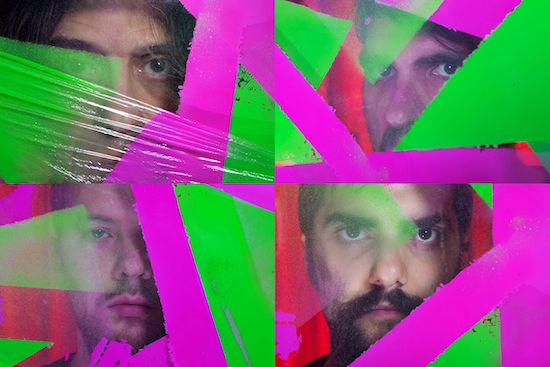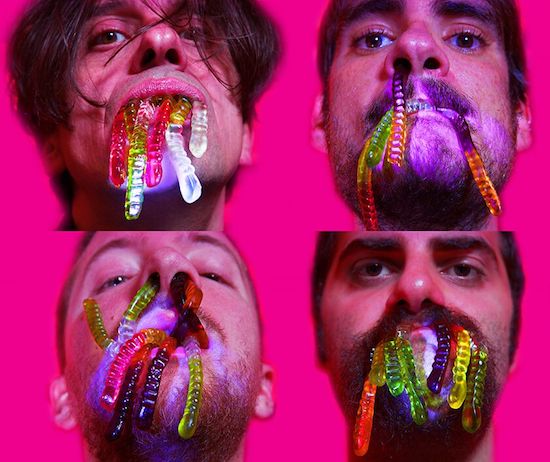To Mamuthones’ chief-in-command, Alessio Gastaldello, the world is a frightening place. The Italian dance-punks’ latest album, Fear On The Corner, released recently on Rocket Recordings, is a chaotic funhouse display of deranged rhythms, whacked out synthesisers and impassioned vocals that invoke James Murphy on a pretty intense ayahuasca trip.
It is also an ode to fear in all of its forms; as Gastaldello puts it, the record is about “fear of the present, of human situations, fear of the new political situation, fear of political decisions being taken from other people’s fear, but also fear of relationship breakdown, fear of being alone or fear of being together with the wrong people, fear of not finding a place in the world, personal fear and obsession… fear of fear itself.”
It’s fitting then that the origins of the band itself are essentially a product of fear – or one specific fear at least; a visceral reaction to something uncanny. After leaving his previous band – the Sub-Pop signed psychedelic rockers Jennifer Gentle – Gastaldello briefly flirted with academia, taking on a research role at Università Iuav di Venezia.
“I never felt part of that world. I felt I was on ‘the wrong side’", he says. It was during this time that he took a fateful trip to the island of Sardinia, where he first encountered the devilish masked creatures from which Mamuthones take a name [they are masked figures who join in the Mamoiada carnival every year]. “It was the first thing I saw arriving at the airport,” he explains. “There was a poster, and I was shocked by the figures!”
Unable to get such a disturbing image out of his head, Gastaldello adopted the moniker for his solo work when he returned to mainland Italy. The initial Mamuthones sound was steeped in the adopted theme of pre-Christian ritualism, what he describes as “obscure”, “primitive” and “awkward” music. Indeed, their debut record Sator is an exercise in abstraction, emphasising amaranthine drones, whispered vocals and scattershot electronics.
But when Gastaldello developed Mamuthones into a live beast, he began to realise that something was changing: “The music became louder and the rhythms became more danceable.” The latest record Fear On The Corner has been touted as a kind of rebirth, although Gastaldello talks about it in the terms of a more gradual shift within the band: “It’s really something that happened step-by-step.”
The real catalyst for change came in the form of Rocket Recordings’ honchos Johnny and Chris. Gastaldello describes the first release on said label, a split with Evil Blizzard called Collisions. “I had an album [completed] that was about 50/50 new and old. When I sent it to [Rocket Recordings], they asked me to focus on the new stuff, to pump up this aspect of our music. So I went deep, listening to lots of post punk.” Specifically, Gastaldello found inspiration in the Strut compilation Disco Not Disco, a collection of leftfield dance music taken from the New York underground. “It’s dance music played by punks!”
Subverting the trope of the totalitarian record label commanding their artist to toe the creative line, Gastaldello speaks with much enthusiasm about Rocket’s involvement in the Fear On The Corner writing and recording process. “They have a great [knowledge of] musical culture. It’s like you’re working with an expert producer. Why don’t you put a synthesiser here, an echo here? It’s very useful. I think they’re one of the best labels out there at the moment.”
So getting back to that theme of fear, then. What is it that scares Alessio Gastaldello, and how did it influence the new album? “Just before we started the recording session, the Bataclan attacks happened. Of course, all terrorism is terrible – but I felt that event very closely.” For Gastaldello, the theatre represented a kind of artistic purity. He refers to a copy of the 1972 Lou Reed, John Cale and Nico live LP. “When I was a teenager there was a halo around this concert.”
Gastaldello also brings up the current political climate in Italy, with fascist parties rising in power, riots in the streets and tensions between natives and immigrants reaching boiling point. “It’s incredible to think that, in 2018, people are scared of black people.” he says with quite some exasperation “I think the majority of people in Italy are. This should not be happening. There’s a lot of propaganda now – ten years ago, it was not like this.”
It’s not just political struggles that concern Gastaldello: "This is just one of the fears that we talk about on the album!” He is also influenced by personal fears – it seems that the musician is deeply worried about what he perceives to be a breakdown in human relationships. “There is a difficulty in communication. People stay together, but they don’t talk together. You are forced to be with people through your job and when you have kids, through school events, or sports events. You deal with people who you are not interested in, but you have to be smiling. This brings home a lot of tension.”

It’s this “fear of fear” that Gastaldello describes: not communicating your true thoughts out of fear of the social implications, fear of the negativity it might bring which in turn breeds resentment. However, he was not really aware of the thematic material until after Fear On The Corner was completed. It certainly wasn’t a conscious decision to deal with such subject matter, and it’s only in retrospect that he is able to identify exactly what his lyrics are really about. “My lyrics are something close to stream-of-consciousness. I don’t realise, in a proper way, what I’m talking about [until afterwards]. Most of it is just searching for the right word to go with the rhythm.”
Another way in which Gastaldello derives meaning from retrospect is when it comes to the title of the album. He is keen to dispel a press myth: the idea that Fear On The Corner is an ambitious attempt to marry two landmark experimental records: Talking Heads’ Fear Of Music, and Miles Davis’ On The Corner. “The title did not come because I thought of those albums. The title came from the idea of fear [literally] being round the corner. I think Talking Heads is evident [as an influence] on the album, but more Remain In Light than Fear Of Music.”
It’s certainly true that Mamuthones’ looped funk chaos and paranoid lyricism is more reminiscent of David Byrne and co’s afrobeat-inspired fourth outing. “And On The Corner, the repetition and looping… but this is something I’ve listened to for years.” It wasn’t until after the album was completed that the idea of amalgamation was posited as a selling point.
“From a journalistic point of view, of course, it’s the perfect thing to say,” says Gastaldello with a wry smile.
Read tQ’s review of Fear On The Corner here. Mamuthones play the Rocket 20 weekender at the Garage on Saturday 10 March



